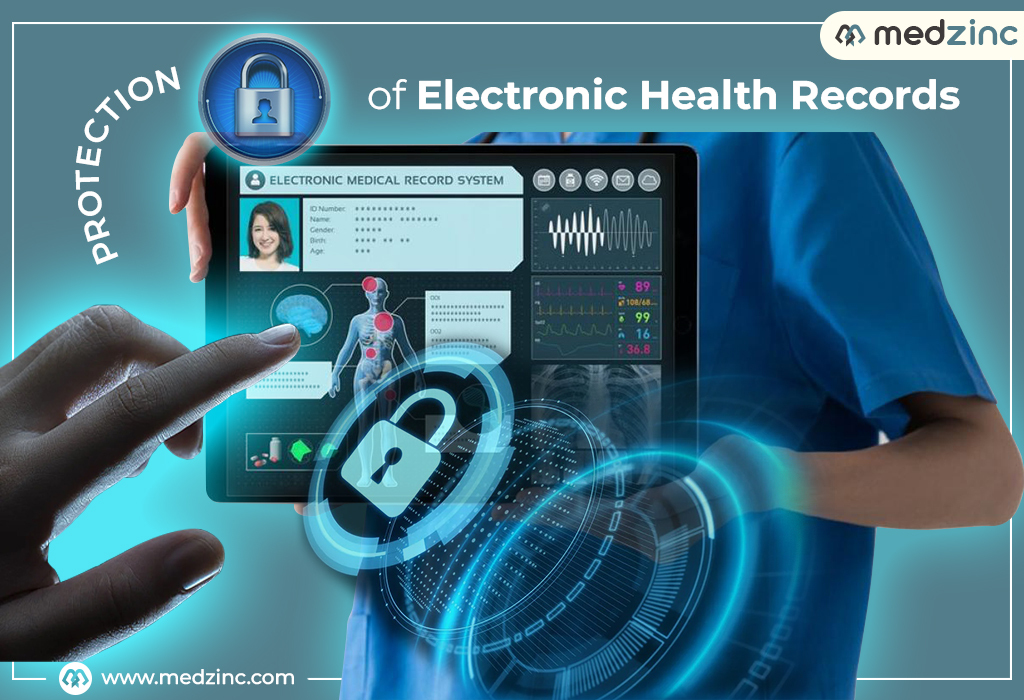
Ways to Protect Electronic Health Records
Despite the best efforts and strictness of HIPPA in Protecting EHR, the number of Electronic Health Records (EHR) lost or stolen increases year after year. According to the HIPAA journal, over 500,000 records were compromised in January 2018 alone. In comparison to other breaches, it may not seem like much. However, due to the sensitive nature of an EHR, the breach could be extremely damaging. And, as we move further into the digital age, the presence of Electronic Health Records grows. As a result, it is an ideal target for criminal activity. As a result, your organization must take proactive steps to protect EHR's data. Following that, medzinc has five tips to help you protect your electronic health records. But before we move forward to that part, it’s critical to know the importance of protecting EHR.
Importance of protecting EHR (Electronic Health Records)
It is extremely beneficial to keep EHR out of the wrong hands. Because it contains sensitive health information, a minor change could jeopardize the entire healthcare system. Protection of EHR is very important due to the following reasons:
Trust-based Patient-Doctor relationship
The first and most important issue is the breakdown of trust between patients and doctors. As we all know, patients only share their problems with doctors who they trust to keep them safe and secure. However, with the increasing loss of their health records, patients tend to develop trust issues. As a result, it jeopardizes the treatment's success. To maintain the same level of trust with your patient, protecting EHR at any cost is highly important.
Transactions for Medical Bills
This is the most common problem with the increasing loss of medical records. EHR contains all of the patient's specific information, including their history, current illness, and much more. The payment method used for paying the medical bill is one example of critical information. A recent discovery shows that in the majority of lost EHR health records, criminals tend to fake medical billing and credit all of the money to their account. Being spread out over the dark web makes it difficult to track them down.
Altering of Health records
Alteration of EHRs can result in fatal consequences. As we know, giving wrong medications or treatments to a patient can lead to irreparable damages to their health. For instance, consider the case of a cancer patient with altered EHR. His entire life will be on the verge of ending if wrong medications or treatment is given. This is why it is critical to safeguard EHR records so that it remains unaltered. Protection of EHR is very important due to the following reasons:
Ways to protect Electronic Health Records
Here are a few ways that will help your organization in Protecting EHR from cyber threats.
Perform Regular IT Risk Assessments
Doing Risk assessments regularly is the key element that plays a vital role in protecting EHR. Performing routine Risk Assessments might not seem as worthy but, underestimating its true potential is not worthy. As with constant changes in healthcare organizations, it is vital to evaluate the risk they pose. A regular risk assessment will not only identify security gaps but will protect EHR from a destructive data breach.
Clean-Up Unnecessary Data
Organizations frequently collect, store, and process massive amounts of data that are unnecessary. Data like this, as well as stale accounts, can present enormous opportunities for hackers. Therefore, it’s best to classify and separate the sensitive data from the data that can be removed. Maintaining clean databases and systems can significantly reduce the risk of data theft. Thus, protecting EHR effectively & efficiently.
Patch and Update Regularly
Updating your systems is essential for a variety of reasons. Not only do updates close security gaps and remove bugs. However, they also provide advantages such as
- Adding features and
- Expelling those that are no longer required.
Even though hackers frequently discover security flaws. However, with upgrades and patches released immediately, will help avoid further exploitation of the discovered sensitivity.
Related Post
No results.